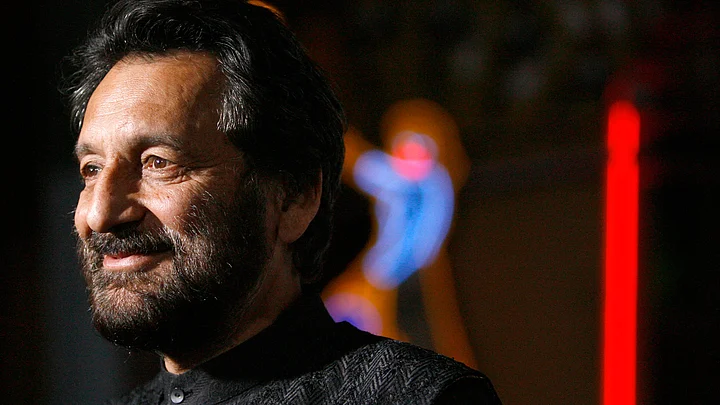He has just finished chairing the jury of the International Film Festival of India in Goa. And he’s undaunted by the fact that his long-cherished project, Paani, on the subject of water scarcity in India still has to take off, but is sure that it will, laughingly, “before the water taps dry up.”
And of course, he’s still alive and kicking in the public mind for helming the superior-quality films Masoom (1983) and Mr India (1987) during his tryst with Bollywood.
His crossover to global cinema yielded the Oscar-feted Elizabeth (1998) and its sequel Elizabeth: The Golden Age (2007). That he wasn’t garlanded with an Oscar for direction is just one of those aberrations of the Oscar ceremony.
‘We Lost With The Censors’
Richard Gere and Brad Pitt are among the Hollywood actors who have gone on record to say that they would leap at an offer to collaborate with the director.
That’s Shekhar Kapur, who at 69, carries on with his lust for life and cinema. According to me, at least, his profoundly disturbing and breakaway film Bandit Queen (1994) – a biopic on Phoolan Devi, the feared bandit who eventually became a politician – remains his most accomplished work to date.
So much by way of a preface to the powerhouse film Bandit Queen, which had to cut through censorship hoops galore in its country of conception. In fact, against the backdrop of the present endlessly chaotic film censorship policy, I can’t help wondering if Bandit Queen would have obtained a green-light from the Central Board of Film Certification today.
“Oh god, I’m so caught up right now,” Kapur reacts initially, when I approach him for an interview. Could we postpone it to next week perhaps?
Not a chance, I insist.
Film censorship is the topic du
jour. And the precedent of the agonies suffered by his Bandit Queen is relevant
to the ongoing dilemma of freedom of expression – and truth telling – in our
cinema. Or are we now likely to veer towards films which are as cutie-pie as a
teddy bear’s picnic?
“A filmmaker has to believe in what he or she is doing and fight it out,” Shekhar responds, adding quite categorically, “That’s why I have no sympathy for those who cry about intolerance when someone goes against their work. The point is never to give up. Ask yourself: What do you believe in? To what extent, are you willing to fight it out? What are you willing to give up?”
In this dramatic vein, Kapur narrates that Bandit Queen (produced by Bobby Bedi), was one helluva prize fight.
We didn’t ever give up the fight, not for a moment. We lost with the censors, we lost again with its Revising Committee and finally went to court. The judge was far more reasonable, and we could release the film, at long last.Shekhar Kapur.
‘Film Industry Went Against Bandit Queen’
Next question: What was the take of the convention-bound Bollywood fraternity, be it in the depiction of nudity or the taboo colloquial dialogue? Apparently, the knives were sharpened against him because Bandit Queen “threatened” to become an incredible hit.
“Threatened”, did he say? Could he elaborate? Without mincing words, he recalls, “Very clearly, the film industry went against Bandit Queen, doling out statements that it was doing well only because of a single nude scene. Next, we had exclusive shows for women audiences and they threatened to make the film a bigger hit.”
Right in the midst of overwhelming approval from the cognoscenti as well as the masses, the director points out, “And what do you know? A High Court judgement from Rajasthan ruled that the film was pornographic, anti-upper caste and that the censors had not done their job correctly. So we fought it out in the Supreme Court and quoted the Constitution. After months of argument, we won. And the censored version was released across the nation.”
The ‘fight to the finish’ did have its downers since Bandit Queen lost out a chunk of ticket sales because, “many had already seen the film in its pirated version on video cassettes.”
‘Bandit Queen Was Unforgiving’
Unstoppable now, Kapur says, “The process took two years of our lives. But we were right. If we hadn’t fought, I believe Ram Gopal Varma’s Satya and Anurag Kashyap’s films like Gangs of Wasseypur would have had to fight the fight which we did. Sometimes, I wonder would they have done so?”
Has he seen any other film which can match Bandit Queen for its graphic boldness? “At the risk of being immodest,” the filmmaker says, “I haven’t seen a film as unforgiving as Bandit Queen ever since, not from India at least. Frankly, I wish there were more.”
Postcript: The censorship hoopla, the opposition of the Mumbai film industry and vitriolic criticism by author Arundhati Roy, the biopic went on to amass awards. These include:
- National Award for Best Feature Film in Hindi
- National Award for Best Actress (Seema Biswas in the title role)
- National Award for Best Costume Design (Dolly Ahluwalia)
- Filmfare Critics’ Award for Best Film
- Filmfare Award for Best Direction
- Filmfare Award for Sensational Debut (Seema Biswas)
- Filmfare Award for Best Cinematography (Ashok Mehta)
(The writer is a film critic, filmmaker,
theatre director and a weekend painter)
(At The Quint, we question everything. Play an active role in shaping our journalism by becoming a member today.)
